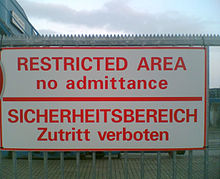International Ship and Port Facility Security Code
- International Ship and Port Facility Security Code
-

Absperrung eines Hafenbereichs gemäß ISPS-Code
Der International Ship and Port Facility Security Code (ISPS-Code) besteht aus einem umfangreichen Paket von Maßnahmen zur Gefahrenabwehr bei Schiffen und Häfen. Damit dient der ISPS-Code der Sicherheit in der Lieferkette. Diese Vereinbarung wurde am 12. Dezember 2002 unter der Federführung der Internationalen Seeschifffahrtsorganisation (IMO) getroffen und als Ergänzung des Internationalen Übereinkommens von 1974 zum Schutz des menschlichen Lebens auf See (SOLAS-Übereinkommen) implementiert. Auslöser für die Schaffung des Regelwerks waren u.a. die Terroranschläge am 11. September 2001 in New York. Seitdem müssen nahezu alle Schiffe, die einen Hafen anlaufen, zuvor explizit übermitteln, welche Ladung sie an Bord haben. Die Behörden des anlaufenden Hafens haben umfassende Kontrollrechte.
Des Weiteren wurde bestimmt, dass die Hafenanlagen - die bisher praktisch für jeden frei zugänglich waren - hermetisch abgeschottet werden. Ein Zugang ist jetzt nur noch für bestimmte Personenkreise möglich, diese müssen sich regulär ausweisen und bekommen dann für die Dauer ihres Aufenthalts in den Hafenanlagen eine Identifikationskarte ausgehändigt.
In der Europäischen Union wurde der ISPS-Code durch eine Verordnung des Europäischen Parlaments und des Rates am 31. März 2004 umgesetzt. Dabei wurden die Regelungen, die eigentlich nur für internationale Schiffe gelten sollten, auch auf den Schiffsverkehr innerhalb der Europäischen Union und seiner Mitgliedsstaaten ausgeweitet.
Siehe auch
Weblinks
Verordnung (EG) 725/2004 vom 31. März 2004 zur Einführung des ISPS-Codes in der Europäischen Union
Wikimedia Foundation.
Schlagen Sie auch in anderen Wörterbüchern nach:
International Ship and Port Facility Security Code — The International Ship and Port Facility Security (ISPS) Code is an amendment to the Safety of Life at Sea (SOLAS) Convention (1974/1988) on minimium security arrangements for ships, ports and government agencies. Having come into force in 2004,… … Wikipedia
International Ship and Port Security — Code international pour la sûreté des navires et des installations portuaires Panneau interdisant l accès au quai, utilisé lors d opérations avec des navires de croisière … Wikipédia en Français
Port security — refers to the defense, law and treaty enforcement, and counterterrorism activities that fall within the port and maritime domain. It includes the protection of the seaports themselves, the protection and inspection of the cargo moving through the … Wikipedia
International Register of Shipping — The International Register of Shipping or IS was established in 1993, and is an independent classification society which provides classification, certification, verification and advisory services. The International Register of Shipping also… … Wikipedia
International Maritime Organisation — Flagge der IMO Die Internationale Seeschifffahrts Organisation (englisch: International Maritime Organization, IMO) ist eine Sonderorganisation der Vereinten Nationen mit Sitz in London. Bis zum 21. Mai 1982 hieß sie Zwischenstaatliche Beratende… … Deutsch Wikipedia
International Maritime Organization — Flagge der IMO Die Internationale Seeschifffahrts Organisation (englisch: International Maritime Organization, IMO) ist eine Sonderorganisation der Vereinten Nationen mit Sitz in London. Bis zum 21. Mai 1982 hieß sie Zwischenstaatliche Beratende… … Deutsch Wikipedia
Port Chaplain — Seemannsheim der Deutschen Seemannsmission in Lübeck, An der Untertrave Die Deutsche Seemannsmission (German Seaman s Mission) ist eine christliche Sozialeinrichtung für Seeleute. Die Deutsche Seemannsmission betreibt Stationen in 17 deutschen… … Deutsch Wikipedia
International Convention for the Safety of Life at Sea — The Safety of Life at Sea (SOLAS) is the most important treaty protecting the safety of merchant ships. The first version of the treaty was passed in 1914 in response to the sinking of the RMS Titanic . It prescribed numbers of lifeboats and… … Wikipedia
International Maritime Organization — International Maritime Organization … Wikipedia
Maritime Security Regimes — are codes and conventions of behavior agreed upon by coastal states to provide a degree of security within territorial waters and on the high seas. Contents 1 Purpose 2 Theory 3 History 4 List of … Wikipedia

